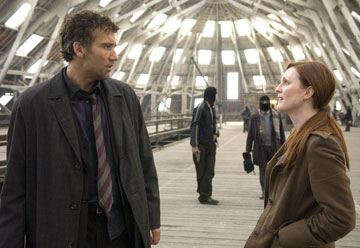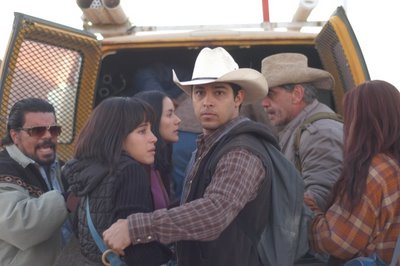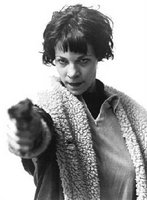
The social, economic and political upheaval depicted in The Children of Men is quite conceivable. We are not given any explanation why the world has been transformed, though we get hints of nuclear devastation and turmoil in other parts of the world from newspaper headlines posted on walls and in the street. Also not divulged is why no children have been born for over 18 years.
The sparse elucidation in the film is not a weakness; it is in fact a potent tool that is used in tandem with other devices to create a powerful effect – that of mayhem, confusion and dislocation. These are all normal side-effects of war, civil or otherwise. People are bundled along, herded like cattle, running in fear of things heard but not necessarily seen. Explanations are not handed out on a platter and this adds to a freshness that is a welcome departure from the mindlessness of most Hollywood movies. After all, the citizens of the planet do not themselves know the reasons behind female infertility, and we get to share the confusion. Mystery in cinema can be (and in this film is) a good thing.
Politically, it’s not too hard to foresee such a bleak future, because aspects of it exist right now: Guantanamo, Mamdouh Habib, Abu Ghraib, refugee camps and detention centres are words that immediately spring to mind. The dehumanising of refugees and the association of them as being on a par with terrorists is something regrettably we have already seen in our lifetime.
The camera work is excellent, with the use of wide angles and sweeping takes that follow the protagonists as if the camera operator – and we – are an embedded journalist in a real-life war situation. At one stage, we even see specks of ‘blood’ on the camera, adding to the sense of immediacy. The film is quite relentless from start to finish, creating a solid feeling of tension and anxiety. The cinematography is also used to great effect, creating a sense of real bleakness. There is great attention to detail in various scenes depicting urban and industrial wastelands, adding to a tangible sense of chaos and anarchy.
Alfonso Cuarón has developed an impressive body of work to his credit with films as diverse as this, Y tu Mama Tambien and Harry Potter and the Prisoner of Azkaban. Y tu Mama Tambien remains my favourite of his works, though Children of Men shows a great deal of risk and innovation that deserves recognition. In spite of this, the film had some reasonably significant faults that cannot be overlooked.
In a landscape that is so miserable, where people’s lives are so grim, the use of pop music was often inappropriate, mostly in the first half of the film. I really liked the music, but its use detracted from the consistency of the film. It seemed to reveal a slight unwillingness by the director to completely commit to the risks he took in portraying such a bleak futuristic view.
There were a number of inconsistencies. The most noticeable was that it was night time when the car was being pushed downhill to escape the farmhouse. By the time the car reached the bottom of the hill (maybe a minute later), it was light. And why push-start the car at the bottom of the hill? It made no sense, when it could have been started while coasting down the hill.
Another distraction was the contrived use of hand-held camera with what I call ‘designer shake’ which I first noticed some years ago in TV’s NYPD Blue. Hand-held cameras can be used to good effect by creating a sense of immediacy, that you're there amongst the action. Generally it was used effectively in this film, but there was no need to accentuate the shaking. This was particularly so in the first half of the film during the relatively quiet scenes, and for me it made it an effort to connect with the film.
For some time I have been observing a fad for UK films to cast one American actor or vice versa. This appears to be a device used primarily for marketing purposes. Sometimes its use is so contrived that it detracts from a film, such as Gwyneth Paltrow in Sliding Doors. In other films it has worked well, such as Helena Bonham-Carter in Fight Club. While I am a fan of American actor Julianne Moore, her appearance in this film seems to be neither a positive nor a negative in this respect.
Michael Caine’s character looked good on the screen, but seemed cartoonish, as if from V For Vendetta. His part was overplayed, like Geoffrey Rush's in Candy. Other characters had a similar but lesser effect. Another contrivance is the popular use in British cinema of the term ‘wanker’. For god’s sake, they got this term from Australians, and now it’s used much more than we ever have. It gets a bit tedious.
The near-religious symbolism of the child with Joseph- and Mary-like characters was used to powerful emotional effect, but was then wasted with the implausibility that an entire troop of soldiers will let them pass unchecked and get away. The ambiguity of the ending was, however, effective. The arrival of ‘Tomorrow’ gives hope without a clear outcome, reminiscent of Charlton Heston in The Omega Man (1971). Interestingly, the plot of The Children of Men has a lot in common with this earlier film.
Overall, the film is powerful, engaging, innovative, intelligent, visually stunning and exciting. It conveys an interesting story that includes important political commentary. Its failings are not fatal, but detract from what could otherwise have been a really important work. It is definitely worth seeing for its innovation alone.




Dir: Alfonso Cuarón Rating: MA Duration: 100 min Genre: adventure/science fiction/thriller Language: English Country: UK Release: 19/10/06, wide Viewed: 28/10/06, Palace Dendy Brighton Dist: UIP Prod Co: Strike Entertainment Prod: Hilary Shor, Marc Abraham, Tony Smith, Eric Newman, Iain Smith Scr: PD James, Alfonso Cuarón Sound Des: David Evans Phot: Emmanuel Lubezki Ed: Alex Rodriguez, Alfonso Cuarón Prod Des: Jim Clay, Georffrey Kirkland Mus: Becca Gatrell Cast: Clive Owen, Julianne Moore, Michael Caine, Chiwetel Ejiofor, Charlie Hunnam, Claire-Hope Ashitey
Official website IMDB







